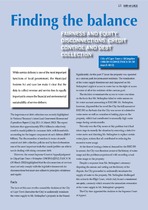| dc.contributor.author | May, Annette | |
| dc.date.accessioned | 2019-08-19T06:57:42Z | |
| dc.date.available | 2019-08-19T06:57:42Z | |
| dc.date.issued | 2012-06 | |
| dc.identifier.citation | May A 'Finding the balance: Fairness and equity, disconnections, credit control and debt collection' (2012) 2 Local Government Bulletin 13-14 | en_US |
| dc.identifier.uri | http://hdl.handle.net/10566/4802 | |
| dc.description.abstract | While service delivery is one of the most important functions of local government, the Municipal Systems Act and case law make it clear that the duty to collect revenue and service fees and equally important to ensure financial and environmental sustainability of service delivery. The importance of debt collection was recently highlighted in the National Treasury's latest Local Government Revenue and Expenditure Report. The report indicates that approximately R76.6. billion is collectively owed to municipalities in consumer debt, with households accounting for the largest component of such debtors (R49.9 billion). The disconnection of services in terms of credit control and debt collection policies and by-laws is therefore one of the most important tools that municipalities are able to use in dealing with rising consumer debt. | en_US |
| dc.language.iso | en | en_US |
| dc.publisher | Local Government Bulletin | en_US |
| dc.subject | Fairness and equity | en_US |
| dc.subject | Municipal Systems Act | en_US |
| dc.subject | Service delivery | en_US |
| dc.subject | Credit control | en_US |
| dc.subject | Debt collection | en_US |
| dc.title | Finding the balance: Fairness and equity, disconnections, credit control and debt collection | en_US |
| dc.type | Article | en_US |

